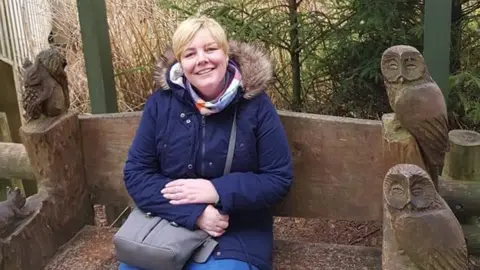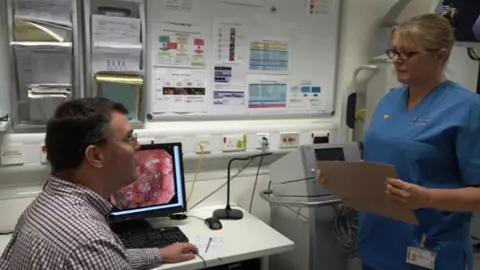Cancer: Wales' new waiting times results a UK-first
 Getty Images
Getty ImagesWales has become the first UK nation to introduce a single waiting time target for cancer patients.
It aims to speed up diagnosis and improve poor survival rates for 17,600 people who get the disease every year.
All patients now have their waiting time measured from when cancer is first suspected, not when they are first referred to hospital.
The first set of figures show 74.4% of the 1,374 patients started treatment within the 62-day target.
Both England and Northern Ireland are watching developments in Wales closely.
Under the old system - which is still being measured in parallel with the new target - how a patient's cancer is identified determined whether they are put on a 31-day or 62-day treatment pathway.
Urgent cases - when the signs are obvious - were referred by a GP to hospital and treatment was supposed to start within 62 days.
But if symptoms were unclear, vague or there is a suspicion it could be cancer - people faced months of being sent around different parts of the health service before being diagnosed.
Only when that happened did the clock start - and then people were on the non-urgent 31-day route.
All Welsh patients are now being measured against a 62-day pathway, which crucially starts at the earlier point.
Thursday figures show that more than 13,400 patients presented themselves with symptoms but in most cases it did not turn out to be cancer.
Clinicians say these patients should also benefit, as they will be investigated and treated for whatever is wrong with them.
Of those who did get diagnosed with cancer, around 350 patients waited beyond the target time for treatment.
The figures also gave a breakdown by health board, showing nearly 85% of patients in Hywel Dda were treated in June within the 62-day target, down to 64.5% in Cwm Taf.
Health officials say the new measure will also help them identify any weaknesses within departments inside health boards more accurately, while internal analysis over the last year has already shown improvements in the speed patients were seen.
Altogether, 79.4% of patients on the old urgent route measure were seen within the target and 96.1% on the non-urgent route.
Cancer referrals have risen by almost 50% in the past five years and the latest figures for June under the old measures saw 163 patients waiting beyond the target time for treatment - slightly down on the previous month, which was the highest number on record.


Cancer 'knocked me for six'
Amy Cooke, 35, from Prestatyn, Denbighshire, found a lump on her breast in June 2017. She had been sunbathing trying to get a "pre-tan" before a holiday to Turkey when she noticed it.
The next morning she went to her GP, but the doctor was not too concerned because she showed no other symptoms and did not have a family history of cancer.
She was told to go to a clinic at Glan Clwyd Hospital a month later - doctors were not happy after an initial mammogram, so she went in for an ultrasound and had a biopsy.
Another week passed before she was told she had developed triple-negative breast cancer, which Amy said "knocked me for six".
After that she said things moved quite quickly - a treatment plan was put in place and she was given a surgery date - from finding the lump to getting treatment took about six weeks.
Looking back, Amy said she was frustrated that - where cancer is strongly suspected - something was not done immediately.
"However long you wait, that wait is too long," she said. "Especially if you know there's something wrong. I could feel my cancer growing inside me every day. It's a ticking time-bomb."
In 2018, Amy was diagnosed with brain metastases, but the tumour was removed and she is currently free of the disease.

Health Minister Vaughan Gething said: "Cancer is the single biggest cause of premature death in Wales and the UK.
"We are supporting health boards to improve performance against the new measure and I'm confident it will lead to an improved service for people affected by cancer. This is a vital step forward in improving cancer outcomes in Wales."
An extra £3m a year is being given to health boards to implement the new measure.

Dr Jeff Turner, consultant gastroenterologist at University Hospital Llandough in Penarth, is involved in testing for stomach and bowel cancer.
"It's fantastic for patients," he said of the new measure.
"When you're referred with symptoms we want to make sure they're investigated as quickly as possible.
"One of the challenges is more patients requiring investigation over shorter period of time but we've done a lot of preparation around this to minimise disruption."
But he warned there could be added pressures on staff and facilities, which will come with the expansion of bowel cancer screening.
Prof Tom Crosby, oncologist and medical director of the Wales Cancer Network, said the old measure did not necessarily accurately reflect a true patient experience or show us more "honestly and transparently" where the problems were.
"This will tell us more accurately how long patients are waiting, it will tell us where the pressure points are and enable us to put resources in to correct some of those deficiencies in the system."
Richard Pugh, of Macmillan Cancer Support in Wales said: "We believe this more transparent approach will highlight where there are delays and what's caused them to drive improvement to ensure every person diagnosed with cancer in Wales has timely treatment which meets their needs."
Cancer Research UK in Wales added: "Going forward, it's vital we see an improvement in results. Key to this will be ensuring the NHS has enough staff in place to test and diagnose cancer".
